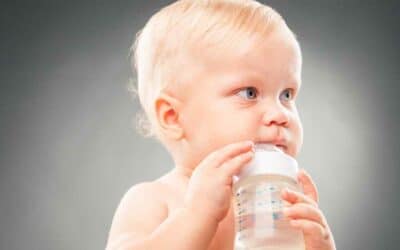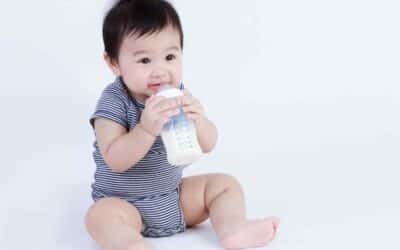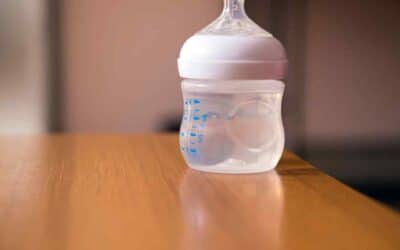Storing and transporting distilled water for baby formula can be a challenge, but it doesn’t have to be. In this guide, we’ll walk you through the safest and most effective methods for storing and transporting distilled water for baby formula, so you can ensure your child has access to safe water at all times.
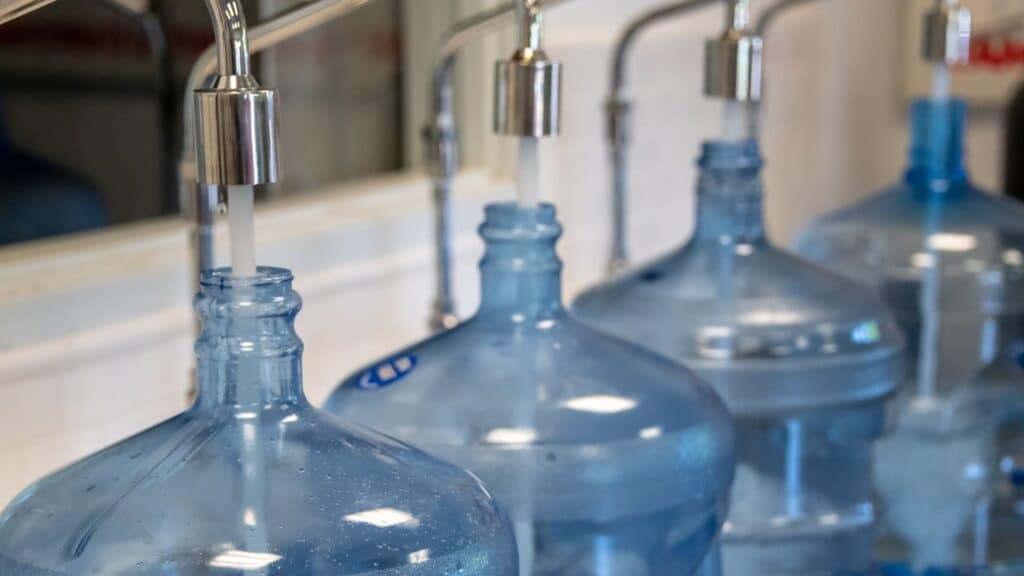
Why Use Distilled Water for Baby Formula?
Distilled water is the purest water you can get. It’s free of all impurities, including minerals and chemicals. This means it’s not just good for your baby’s formula. It’s also safe for them to drink!
One of the most crucial steps in preparing infant formula is using safe and pure water, like distilled water. It’s especially important for babies with weakened immune systems or those born prematurely, as they’re more susceptible to illnesses caused by contaminated water.
Proper infant formula preparation includes using water that’s free of harmful chemicals and toxins, which is why distilled water is the best choice. Always prioritize the safety of your baby’s formula by using the cleanest water possible.
Potential Risks of Using Non-Distilled Water
Using non-distilled water for making infant formula can pose a risk to your baby’s safety. Infants have a weakened immune system, which makes them more susceptible to potentially harmful bacteria that may be present in non-distilled water. Moreover, when the baby drinks formula made with non-distilled water, the bacteria in the water may enter their body and cause infections.
To ensure the safe preparation of infant formula, it’s recommended to use distilled water. If using other water sources, it should be treated through boiling or purification tablets to reduce the risk of contamination. It’s also important to follow the guidelines provided by your local health department regarding the use of different water sources.
It’s worth noting that using too much fluoride in infant formula can also pose a risk to your baby’s health. Excess fluoride can cause fluorosis, a condition that affects the teeth and can cause discoloration or even damage. Therefore, it’s essential to ensure that the water used for making the formula is tested regularly and does not contain excessive levels of fluoride.
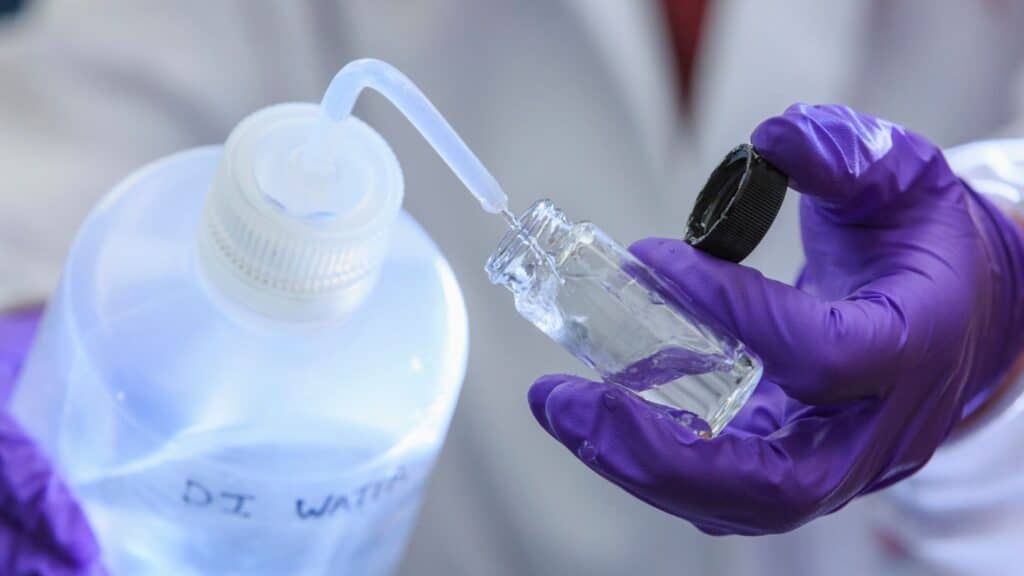
How to Properly Store Distilled Water for Baby Formula
There are many ways to store distilled water for baby formula. Here are some tips on storing distilled water for baby formula:
Choosing the Right Container
If you’re preparing baby formula at home, it’s important to choose the right container for storing the distilled water that you will use for preparing formula. You can use plastic or glass containers, but make sure they have a tight-fitting lid to prevent contamination.
When using plastic containers, look for ones that are labeled as BPA-free. If you prefer glass containers, ensure they are made from borosilicate glass, which is more resistant to thermal shock than regular glass. Alternatively, you can also opt for stainless steel containers that are BPA-free and can be stored in the freezer.
Remember to choose a container that is large enough to hold at least 1 gallon (or 4 quarts for hot climates) of distilled water at room temperature. By following these guidelines, you can ensure the safe preparation of formula for your baby in accordance with the recommendations of the Environmental Protection Agency and the Centers for Disease Control and Prevention.
Keeping the Container Clean
The first step to storing distilled water for baby formula is to make sure that you keep your container clean. This will help prevent bacteria from growing in your water, which can lead to illness. If you’re using a plastic bottle, be sure to wash it with hot soapy water before each use.
If you’re using a glass bottle, make sure you never use it for anything else but distilled water, and then rinse it out thoroughly after each use. It’s also a good idea to sterilize your baby formula container and any utensils used in preparing formula to ensure water safety.
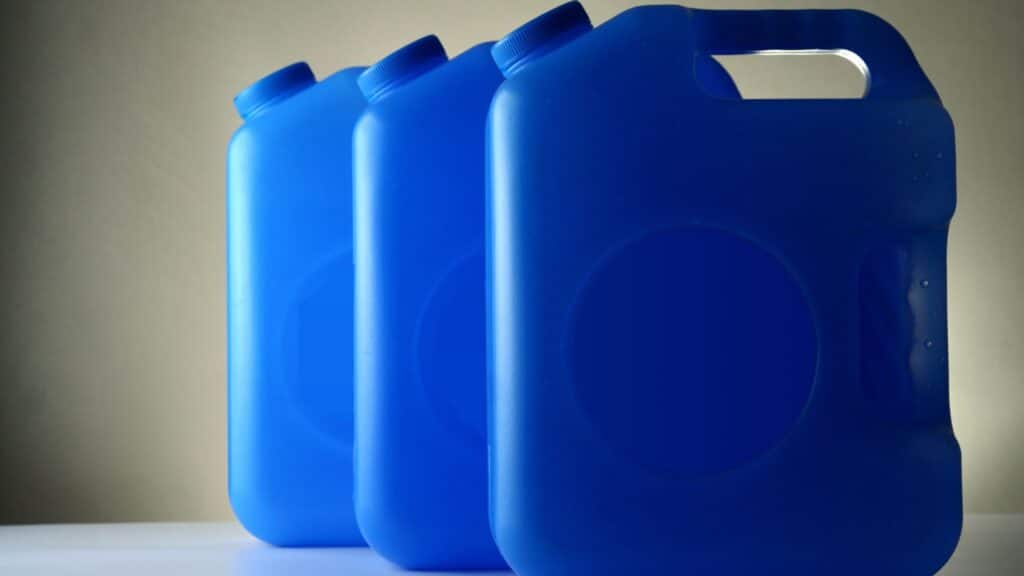
Storing the Container in a Cool, Dry Place
Storing the container in a cool, dry place is really important. If you live in a hot climate, consider putting the bottle in the refrigerator. The temperature should be between 40 and 50 degrees Fahrenheit (5 – 10 degrees Celsius).
If you don’t have space to store it in your refrigerator, you can use an insulated cooler instead. Make sure that the cooler doesn’t get too hot or too cold because this could affect how well your baby’s formula keeps its nutrients over time.
If you store it at room temperature, make sure to keep it away from direct sunlight. Sunlight can also cause bacteria growth in distilled water, so try not to leave it out for long periods of time.
Avoiding Direct Sunlight
This can cause the water to pick up flavors from the sun, which can change its taste and make it less appealing to your child. Also, if you store your distilled water in a plastic container, it’s important to avoid storing it in direct sunlight because this can increase the risk of Bisphenol-A (BPA) exposure.
Using the Water within a Reasonable Timeframe
It’s important to store distilled water for baby formula in the right way because you want the water to stay fresh and safe for your little one. Distilled water is intended for use in baby formula, so it’s important that you store it in a way that ensures it stays clean and clear.
If you’re using the water within a reasonable timeframe, then your best bet is to keep it in its original container. If you can’t use all of the water before it goes bad, then don’t worry. You can still use distilled water as long as it’s been stored correctly.
Remember, when you’re preparing to make baby formula, it’s important to know how to store distilled water properly. This will help ensure that your baby’s formula is safe and free from harmful bacteria.
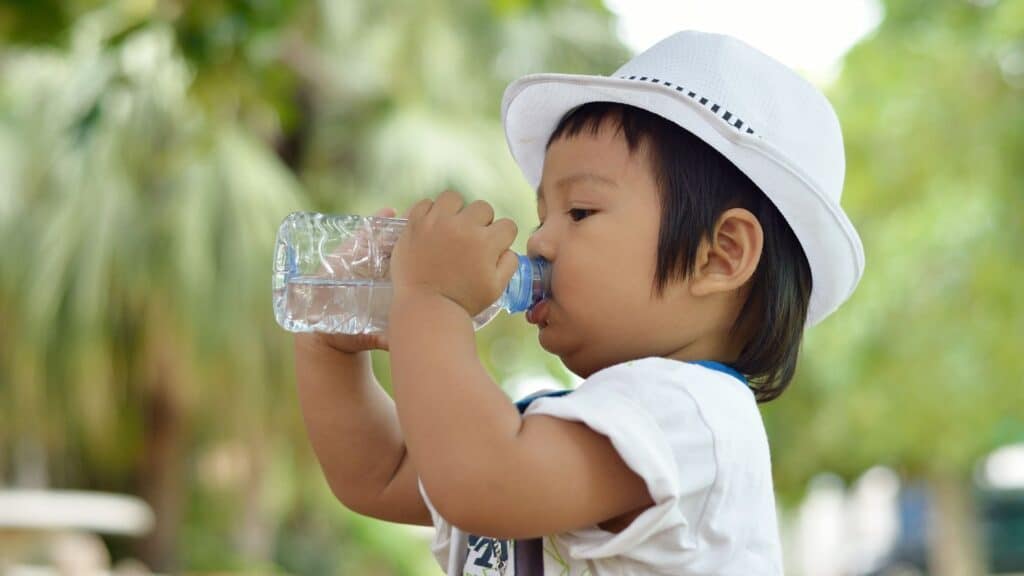
After you’ve filled the bottle with the correct amount of distilled water, make sure to cap it tightly and store it in a cool, dry place. If you’re using a plastic bottle, wash it with hot soapy water before each use to ensure it’s clean and free from any harmful bacteria.
It’s also important to use all the formulas within one hour of preparation. If you have any unused formula, discard it immediately. Hot spots can develop in the formula, which can burn your baby’s mouth and lead to illness. Always follow the guidelines provided by your child’s pediatrician for feeding your baby, and be sure to practice good disease control when preparing and storing baby formula.
How to Transport Distilled Water for Baby Formula
When you need to transport distilled water for baby formula, it’s important to keep it safe and free from contaminants. Here are some tips to follow:
- Use an insulated cooler or thermos to keep the water at a consistent temperature and protect it from external factors that may cause contamination. Make sure to choose a cooler or thermos that is clean and made from food-grade materials.
- Prepare the water in advance and store it in an insulated container if you know you’ll be on the go for an extended period. This helps to ensure that the water remains safe and free from contaminants during transport.
- Use a reliable source of distilled water when preparing for transport. Avoid using tap water or other sources that may contain harmful contaminants.
- Avoid long-term storage of the water in a vehicle or other location with extreme temperatures. High temperatures can cause the water to become contaminated with harmful chemicals and degrade the quality of the container. If you need to store the water for an extended period, ensure that it is stored in an insulated container and kept at a consistent temperature.
- Check the water for any signs of contamination, such as discoloration or an unusual odor, before using it to prepare baby formula. If you notice any signs of contamination, discard the water immediately.
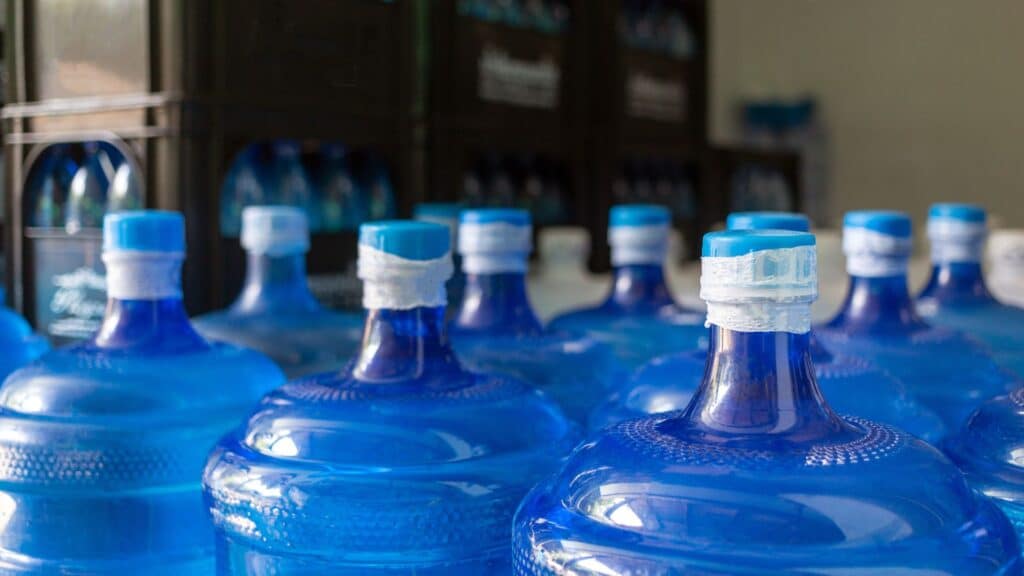
Remember to have enough distilled water on hand when transporting it for baby formula. Accidents can happen, and having enough water ensures that you won’t run out while on the go.
Other Considerations When Using Distilled Water for Baby Formula
There are several other considerations when using distilled water for baby formula.
Be sure to check the water temperature before adding the formula:
Babies are most vulnerable to infection during the first few years of their lives, so you’ll want to make sure that your formula is at body temperature (about 98 degrees Fahrenheit) before feeding it to your child. You can either use an instant-read thermometer or check the temperature by placing your finger in a few drops of liquid. If it feels warm but not hot, then it’s ready!
Check the expiration date of the distilled water:
It’s important to make sure that you’re using fresh distilled water when mixing with powdered baby formula every time you mix up a batch; otherwise, bacteria can grow in it and cause illness in your child. If there’s no expiration date on the bottle, just remember that it should last about three months after purchase (or until opened).
Avoid adding extra minerals or additives to the water:
Avoid adding extra minerals or additives to the water. The point of using distilled water is that it’s as close to pure as possible, so you want to be sure there’s nothing else in there.
Use distilled water exclusively for baby formula:
It’s considered the safest option, and it’s what pediatricians recommend. If you don’t have access to distilled water, check with your pediatrician about other options.

Consult with a pediatrician:
While there are plenty of benefits to using distilled water for formula, it’s important to talk with your doctor before making any changes in your baby’s diet. Your pediatrician can give you advice on how distilled water may affect your child’s health and if there are any other options that could be better for them.
Tips when Preparing Baby Formula
When preparing powdered infant formula, cleanliness is key to ensuring your baby’s safety. Always wash your hands thoroughly before preparing formula and sterilize bottles and utensils to prevent contamination.
For water sources, the best water to use is distilled water, as it is free from contaminants and minerals that may be harmful to infants. If distilled water is not available, use cold running water or low-fluoride bottled water.
If using tap water, be sure to boil it first and test the water temperature before adding powdered formula. When mixing powdered formula, use the appropriate amount of powder formula for the desired amount of water, and avoid overfeeding your baby.
Proper storage of the prepared formula is also important. It’s best to store baby formula or unused baby formula in the refrigerator and use it within 24 hours. Be sure to discard any formula that has been sitting at room temperature for more than two hours or any formula that has been in your baby’s mouth.
Always use a clean baby bottle when feeding your baby, and avoid using a microwave oven to warm the formula. Instead, use a bottle warmer or warm the baby bottle in a bowl of warm water.
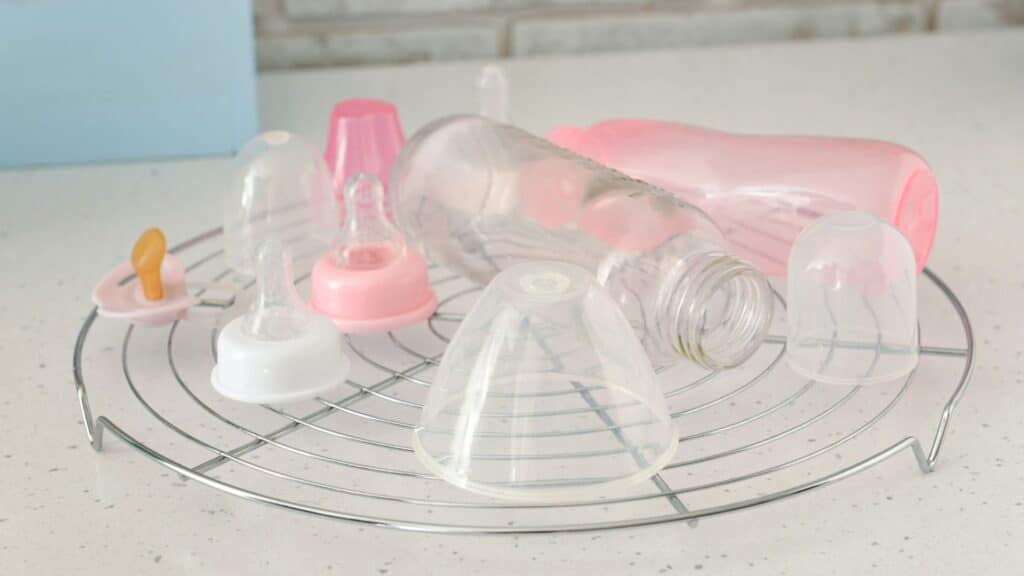
Conclusion
In conclusion, storing and transporting distilled water for baby formula doesn’t have to be a daunting task. By following the tips and guidelines provided in this guide, you can ensure that your baby has access to safe and pure water at all times.
Remember that distilled water is the purest water you can get, free from all impurities and toxins, making it the best option for your infant formula. Choose the right container, keep it clean, store it in a cool, dry place away from direct sunlight, and use it within a reasonable timeframe.
When transporting distilled water, use an insulated cooler or thermos and prepare the water in advance. By taking these precautions, you can rest easy knowing that your baby is getting the best possible nutrition and hydration.
If you have any questions about this, please let me know in the comments below!

